How to Publish a Guided Journal – a Look Behind the Scenes
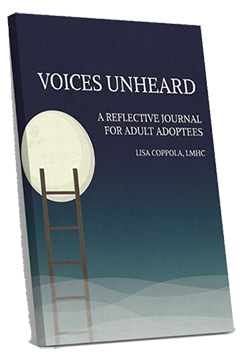
What’s involved in writing and publishing a book for adoptees? The following interview takes us behind the scenes at Boston Post Adoption Resources (BPAR), to learn how our nonprofit developed the idea, design, and publishing plans for Voices Unheard: A Reflective Journal for Adult Adoptees, now on sale in paperback and ebook editions.
A LITTLE BIT OF BACKGROUND
Five years ago in 2017, three clinicians at BPAR introduced the world to Charlie, a child adoptee who narrates our first book, Adoption Is a Lifelong Journey. This illustrated tool for families touched by adoption and foster care and the professionals who help them was released to critical acclaim and has sold thousands of copies. Boston Post Adoption Resources published this book because we believe so strongly in giving adoptees a voice, and the child's voice is so rarely represented or recognized.
This week we were extremely proud to publish Voices Unheard: A Reflective Journal for Adult Adoptees, now on sale at Amazon and Barnes & Noble in paperback and ebook editions. Clinician Lisa "LC" Coppola's 52-week writing journal offers prompts based on core themes that arise in therapy, space for writing, resources including a glossary, and guidelines plus a script to help volunteer moderators run peer groups.
How does a busy nonprofit mental health agency create a book like this? Read the following Q&A for details!
1. How would you describe Voices Unheard: A Reflective Journal for Adult Adoptees, and what makes it unique?
Lisa Coppola, LMHC (author of the journal, BPAR clinician):
The book is a journal and so much more. It offers 52 guided writing prompts based on common themes in adoption that we see clinically at Boston Post Adoption Resources, a nonprofit mental health agency. But the prompts are framed with resources including a Post Adoption Vocabulary section and suggested reading, so the individual writer has access to knowledge if they want to do a deeper dive of study. The combination of prompts and resources also assist professionals who might not be well versed in adoption-related challenges or therapies (most graduate-level programs only spend 8 minutes on the topic of adoption, believe it or not). And finally, I include detailed instructions for volunteers who might want to coordinate peer-led support groups: how to establish a group, how to organize weekly meetings using the journal prompts as themes and assignments, and even a script to make the idea of running a meeting less daunting and more do-able.

2. How did you come up with the concept for this journal?
Lisa:
As licensed mental health counselor, I’ve had more than a decade of experience in running writing support groups and workshops on the themes of identity, recovery, relationships, and other issues that both adoptees and people in recovery from addictions struggle with. As an adoptee and person in long-term recovery from addictions, I’ve been a participant and beneficiary of these types of groups and therapeutic activities myself, so I’ve seen the value from both sides. I know that when people come together to acknowledge a similar struggle, there is a sort of belongingness that develops that I have seen to be the most powerful kind of healing. You see this all of the time in the recovery world in 12-step recovery meetings or other kinds of recovery groups like Refuge Recovery or SMART Recovery. Adoptees are going through this kind of mysterious buried pain and grief, and one that is hardly discussed in public. Adoptees really could benefit from this kind of peer-to-peer recovery. So, I wanted to combine my dual experiences to offer something bigger and more impactful than a traditional prompted writing journal, something with legs and utility to empower adoptees with a tool and to enlarge the professional and volunteer post adoption support system.
3. You’ve said that Voices Unheard: A Reflective Journal for Adoptees is deeply personal for you. Why is that?
Lisa:
I’m an adoptee who has spent a lifetime confronting a history of trauma—quite common in adoption—as well as addiction, and who ultimately has found a path to healing. I share part of my past openly in the early pages of the book. Writing and support groups have been my lifeline
4. What is the value of writing in this reflective journal?
Lisa:
As a mental health counselor, I find that journaling on one's story, trying to sort out the truth through telling one's story, sifting through fears and hopes on paper, is incredibly powerful. It's a way to help clients work their way through disparate and confusing emotions and memories, to identify common threads throughout their lives, and ultimately to connect to the truth of their uniquely personal stories. In individual and group sessions, I guide the journaling process with carefully planned prompts that guide the writer through a revelatory and healing process over time.
5. Why create a journal specifically for adult adoptees?
Kelly DiBenedetto, LMHC (illustrator of the journal, Executive and Clinical Director of BPAR):
Adoption creates frequently unrecognized or misunderstood challenges for the adoptee, whose “happily ever after” adoption by definition began with the painful loss of being relinquished by a birth mother. Babies have preverbal memories. This is not widely understood, but even relinquishment within days of birth causes trauma which becomes a body memory that can surface throughout a lifetime. Statistically, adoptees in the U.S. have disproportionately higher levels of learning disabilities, eating disorders, depression, alcohol and drug abuse, and suicide. Using the latest figures which are lower than normal due to Covid-19, in the US annually, there are about 60,000 adoptions out of foster care, 1,622 intercountry adoptions, and an unknown number of private adoptions, so this is a large and important population to equip with tools and resources.

6. As intake director at BPAR, every day you talk to adoptees and adoptive parents who reach out for mental health support, and you connect them to resources. What are some of the messages you hear the most, and how has your work influenced the Voices Unheard journal?
Erica Kramer, MSW (Intake Director at BPAR):
First of all, adoptees and parents who call me are just so relieved to learn that they are not alone. “I thought something was wrong with me! But you’re saying other people feel this way, too?” It’s normal to encounter post adoption challenges, and it’s healthy to reach out for help. Sometimes individual therapy is the answer, but groups can be very powerful, too. Some clients like both. Sometimes callers need other resources, and I connect them to options that seem to fit the best. I have been so lucky to witness this journal begin as an idea and grow into this amazing book that will be such an incredible resource for the adoptees that I speak with on a daily basis. I love how the journal guides individual reflection but is also educational and even pulls back the curtain on what it takes to set up and run an adoptee peer group. The Voices Unheard journal is one way we can build an even wider community of understanding. I am so excited that we now have this journal for adoptees, one more tool to help BPAR fulfill our mission of supporting adoptees and helping everyone in the adoption constellation feel understood and supported.

7. Why did Boston Post Adoption Resources decide to publish the journal for the mass market?
Kelly:
Our team is passionate about finding creative ways to provide support. There’s historically been a scarcity of resources for the lifelong post adoption journey. Even when resources exist, there’s a low level of awareness. Nationally, 57% of adoptive families don’t access or know about post adoption services. BPAR was founded to help fill that void in support and education, yet our small but mighty team only has so much capacity for individual, family and group therapy. We wanted to publish an adult adoptee journal for a wider audience, providing the benefits of prompts written by a licensed clinician, but accessible at one’s own pace, anywhere.
8. Kelly, you and your husband Albie collaborated with Lisa to design the book cover artwork for the journal. What was that process like?
Kelly:
Lisa came to us with the idea of the moon as a ubiquitous symbol of mystery and wonder that unites so many adoptees, who often reflect on their own beginnings and think of birth parents under the same moon, even if they live a world away. Have you ever heard the phrase “coming out of the fog?” The fog at the bottom represents the concept of denial many adult adoptees face. The ladder provides hope for progress—a path to discovery and insight—as it connects adoptees to their own stories on a journey to healing. As an Art Therapist I am a very visual thinker so it was easy for me to bring LC’s incredible vision to life. I’m more of a pen and paper person so I sketched out the ideas and Albie used his digital art skills to bring it to life on the computer.
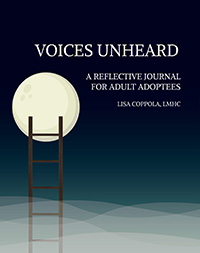
9. You co-authored and illustrated another adoption-related book five years ago, also published by Boston Post Adoption Resources. Can you tell us about it?
Kelly:
As with this journal, clinicians at BPAR created Adoption Is a Lifelong Journey to fill a void. We had been yearning for an unintimidating book for parents and caregivers to help them understand the thoughts and emotions their adopted child might be experiencing through various stages of development, using the simplicity of illustration to make the material accessible and, with supervision, shareable with their child. So I created a character, Charlie, a transracial adoptee who narrates the book in his voice. The child so rarely gets a say, and we wanted Charlie to take the lead as he models expressing his emotions and needs. Parents can recognize common themes in behaviors and stages, and each page links to its own resource section at the back of the book to facilitate family discussions, activities, and additional learning.
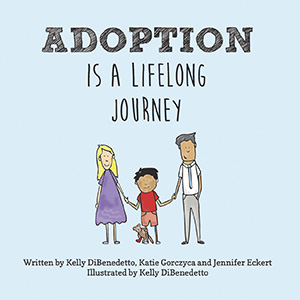
10. How did your past experience as a BPAR board member and design expertise inform your layout choices for the journal?
Ilene Bezahler (journal layout):
A journal for an adult should be just as special as the journal where we recorded our innermost thoughts as children—inviting and something we want to pick up again and again. I believe I understand how emotional the process of self-reflection can be for an adoptee, so I wanted the journal prompt pages to be visually simple and as welcoming as possible. The writing space doesn’t look like lined paper because we thought lines might create pressure to write a certain way or set expectations for length. But we also didn’t want blank pages with text. In adding a design element, we aim to find something that connects to other designs within a book. The ladder element on each prompt page adds some structure to the page and connects with the sense of journey on the cover. The vertical text on the right-hand pages of the weekly prompts and glossary helps the writer easily flip through to find their place. It’s user-friendly.
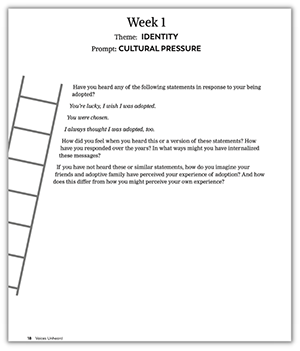
11. You have been involved with the editing and marketing of each of the books published by Boston Post Adoption Resources. Why did you choose to take on these projects?
Lucy Davis (editor of the journal, Director of Marketing & Communications at BPAR):
I recognized in both manuscripts early on that I had encountered truly unique approaches to supporting to a traditionally underserved reader base. I'm careful when I choose my projects; I look for passionate writers with the wisdom to know what readers are missing in the market and the generosity to address exactly what they need in a writing style that readers can understand. I’m proud of how enthusiastically both professionals and parents have responded to Adoption Is a Lifelong Journey as the rare book that honors the child adoptee’s voice. I saw the same kind of potential with the Voices Unheard journal as a tool to help adult adoptees express their own truths.
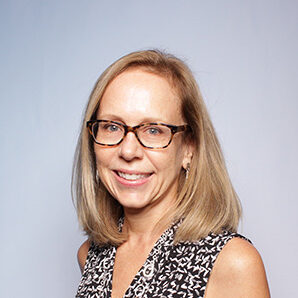
12. What kind of feedback have you had on the journal so far?
Lisa:
We are very excited that highly renowned adoptee writers and adoption professionals have embraced the journal and generously provided written endorsements. In fact, Sharon Kaplan Roszia, co-author of one of the most importance pieces of literature used by therapists trained in adoption competency, validates the approach of this journal and says it is “long overdue” in the field. Well-known adult adoptee writing professionals and adoption advocates have written that this is “a vital tool” that “offers a map for adoptees, one that urges us to listen to the truth of our bodies—the only kind of map we can trust.”
13. What are your hopes for Voices Unheard: A Reflective Journal for Adult Adoptees?
Lisa:
I want the journal to take away the fear of the empty page; to open doors by demonstrating the power of writing; to encourage new groups and communities of understanding, and to validate the worthiness of every adoptee’s unique story.
Kelly:
Just as Adoption Is a Lifelong Journey has continued to resonate over the years with readers, this journal—because it is built around common themes in adoption that have been validated by research and our own experience at BPAR—should have an impact on adoptees and the professional community for years to come.
P.S. We are excited to share that the journal was a bestseller in 2 categories (Adoption Books and Medical Counseling) during the first week of sales on Amazon, and it was the #1 New Release in Medical Counseling!

Voices Unheard: A Reflective Journal for Adult Adoptees
- Adult adoptees can use the journal as a guide individually or under the care of a therapist.
- Therapists can use the journal as a tool in their practice with adopted clients.
- Peer-led support group moderators can use the prompts as weekly assignments, enabling attendees to share their thoughts and build connections in a group setting.
Sources:
Disproportionate eating disorders, etc.
Young, Bohman, Mitchell, Ostroff, Ansfield, Lifton and Schecter
Adoptions out of foster care
https://www.acf.hhs.gov/sites/default/files/documents/cb/afcarsreport28.pdf
1622 Intercountry adoptions to the United States FY 2020
https://travel.state.gov/content/dam/NEWadoptionassets/pdfs/FY%202020%20Annual%20Report%20(V2.1).pdf
Nationally, 57% of adoptive families don’t access or know about post adoption services.
Hartinger-Sanders 2015